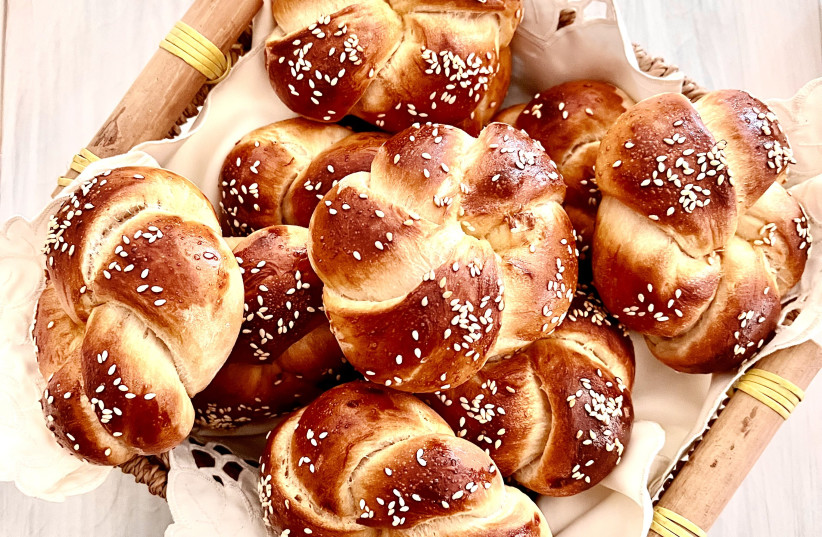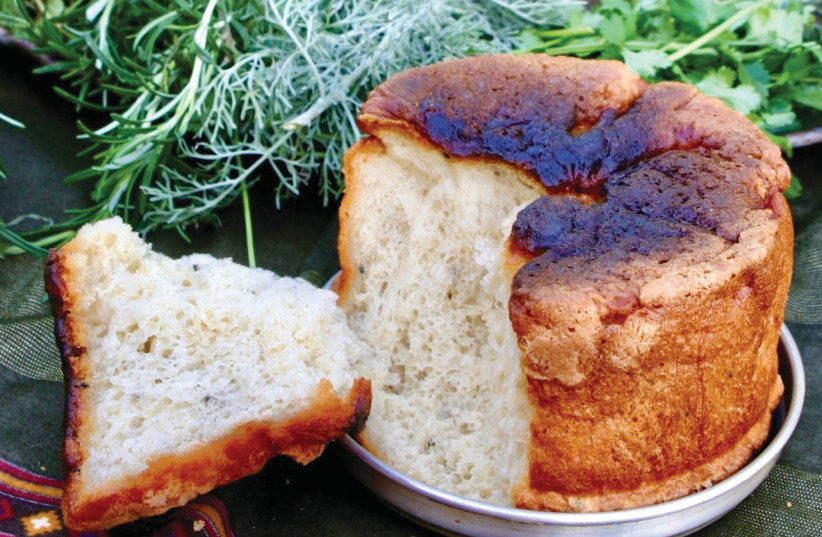With the High Holy Days just around the corner, we will soon be very busy with preparations for the festive meals. I want to take some time, however, to sit back and enjoy a few relaxing moments of mindfulness with freshly baked goods this Shabbat morning.
I always try to have some small sweet or savory treats on hand to nibble on as we’re lounging around the house on Shabbat mornings. Some families will eat special foods when they return from the synagogue, while others like to serve up a scrumptious brunch when everyone in the household has finally rolled out of bed.
Each community has their own unique foods that they are accustomed to eating on Shabbat mornings. Some families serve lots of little salads, while others eat pickled herring, or cholent that has simmered on the plata all night long.
Nowadays, many Israeli families like to include items that they’ve enjoyed or seen in friends’ homes or at hotels, and also add little modern touches to the menu, such as mini-muffins. My favorite Shabbat morning foods are baked goods like burekas, breads, and sweet rolls.
I bake challot and rolls almost every week, and I try to vary the shapes and textures to make them even more appealing. Sometimes I bake Tunisian crackers that are delicious eaten with fresh spreads and hard-boiled eggs that I dig out of the cholent we’ll be having for lunch later that day.

This week, I’m bringing you recipes for three baked treats that are customarily eaten on Shabbat morning. The first recipe is for cheese burekas, that are traditionally made in the shape of a triangle.
One way to cut down on preparation time is to purchase prepared frozen puff pastry dough. Then, all you have to do is mix together the ingredients for the filling. You can use any of a variety of fillings, such as cheese, potato, mushroom, spinach, or any combination that strikes your fancy.
The second recipe is for kubaneh, which hails from Yemenite Jewish cuisine. I’ve received numerous requests over the years from readers who are curious about how kubaneh is prepared. This special bread that is eaten on Shabbat morning is baked in a tall kubaneh pot that comes with a lid that fits on snugly.
The kubaneh dough must be kneaded a number of times, and it slowly cooks all night long as it sits on the plata. Some people separate the dough into balls, which they dip in butter or margarine before placing inside the kubaneh pot. Others form each piece into a spiral shape before placing them in the pan, touching the rest of the pieces, or as one single loaf.
In short, you can form the kubaneh dough into whatever shape you desire – it will always come out warm and delicious for your Shabbat morning treat. Kubaneh is traditionally served with grated tomatoes, spicy zhug, and hard-boiled eggs.
The third recipe is for light and fluffy sweet rolls that are the perfect addition to any meal, regardless of the time of day, and can certainly take your normal Shabbat morning menu up a notch. You can shape the rolls into whatever form you desire. In the past, I’ve made rolls in the shape of spirals, snails, ties, braids, rings, or round balls.
CHEESE BUREKAS
Makes 12-16 burekas.
- 1 package puff pastry, chilled (or square pieces of puff pastry)
Filling:
- 200 gr. white spread cheese 5% (or ricotta, cottage, Canaan)
- 100 gr. feta cheese, crumbled (or Bulgarian, Roquefort)
- 100 gr. yellow hard cheese (or mozzarella, cheddar, Gouda)
- Salt and pepper, to taste
- 1 egg
Toppings:
- 1 egg, beaten with 2-3 drops of oil
- ¼ cup light sesame seeds
- ¼ cup dark sesame seeds
Heat your oven to 190°-200°. Place a sheet of baking paper on a tray, then spray with oil spray. Add all the filling ingredients to a medium bowl and mix well.
Spread the puff pastry on your work surface. Then, with a knife or pizza cutter, cut the pastry dough into 10 cm. x 10 cm. squares, or a bit larger. Just make sure they are all the same size. It’s best to keep any extra pastry dough in the freezer while you’re preparing the burekas. (You can buy packages of preprepared puff pastry squares if you want to cut down on preparation time.)
Take a spoonful or two of the filling and place it in the center of the dough square. Take one corner and fold it over to the opposite corner, making sure there’s no filing near the edges. Seal all the edges of the triangle. You can also take a fork and press down gently into the edges to seal them. Prepare the rest of the burekas in the same way.
Arrange the burekas on the baking tray, making sure that there’s plenty of space between each one.
Break the egg into a glass, then add the oil and beat well. Brush the egg wash on all the burekas, then sprinkle light and dark sesame seeds on top.
Bake in the preheated oven for 20 minutes or until they’ve browned nicely. Serve hot with salads and hard-boiled eggs.
- Level of difficulty: Easy
- Time: 30 minutes
- Status: Dairy

KUBANEH
Use a kubaneh pot or a tall pot with a diameter of 22 cm. or 24 cm., with a lid.
- 20 gr. fresh yeast (or 1 Tbsp. dry yeast granules)
- 1 tsp. sugar
- ½ cup water at room temperature
- 500 gr. flour, sifted
- 1 ½ tsp. salt
- 2 tsp. nigella seeds
- 1-2 cups water
- 80-100 gr. butter or margarine, melted
Dissolve the yeast in a small bowl with the sugar and half a cup of water. Let it ferment for 15 minutes. (If you’re using dry yeast, you can skip this step.)
In a large bowl, mix together the flour, salt, nigella seeds, and the fermented yeast. While kneading the dough, add the water gradually until the dough is soft and pliant. Cover the bowl with a towel or plastic wrap, then put it in a warm place to let the dough rise for 3 ½ hours.
Separate the dough into 6 or 8 equal-sized pieces, and roll them into balls, or whatever shape you desire. Dip each ball in the melted butter, then place it in the kubaneh pot or other pan. Place the first ball in the middle of the pot, then the rest of them in a ring around the one in the middle. Cover the pot with a towel, and put it in a warm place to rise for another 90 minutes. Bake the kubaneh for 45-60 minutes in a preheated oven on 180° until it has turned golden brown. Alternatively, you can place it on a Shabbat plata so that it can cook slowly overnight.
- Level of difficulty: Medium
- Time: 2 hours, not including time for dough to rise
- Status: Dairy or parve
SWEET ROLLS
Makes 24 rolls.
- 1 kg. flour, sifted
- 50 gr. fresh yeast (or 2 Tbsp. dry yeast granules)
- ½ cup sugar
- 1 Tbsp. silan or honey
- ½ cup oil
- 2 Tbsp. margarine or butter
- 1 tsp. salt
- 1 egg, beaten
- 2 ½ – 3 cups water, at room temperature
Egg wash:
- 1 egg, beaten
Topping:
- ½ cup sesame seeds (optional)
Mix the flour, yeast, sugar, oil, silan, margarine (or butter), salt, and egg together in a bowl. Add the water gradually while kneading the dough until it is mixed well and smooth.
Let the dough rise in a warm place until it doubles in volume (60-90 minutes).
Separate the dough into 24 equal-sized sections. Roll each section into a ball, then flatten each ball into a flat circle. Next, roll up each circle into a tube shape, then twist the tube into the shape of a number 8, tucking the ends underneath the dough. Prepare the rest of the balls in the same fashion. Place the dough rolls in a greased pan, with space between each one. Let the dough rise for another 15 minutes, then brush with egg wash and sprinkle sesame seeds on top. Place the dough in an oven that has been preheated to 200° and bake for 25 minutes or until the rolls have turned golden brown.
- Level of difficulty: Medium
- Time: 40 minutes, not including time for dough to rise
- Status: Dairy or parve
Translated by Hannah Hochner.
